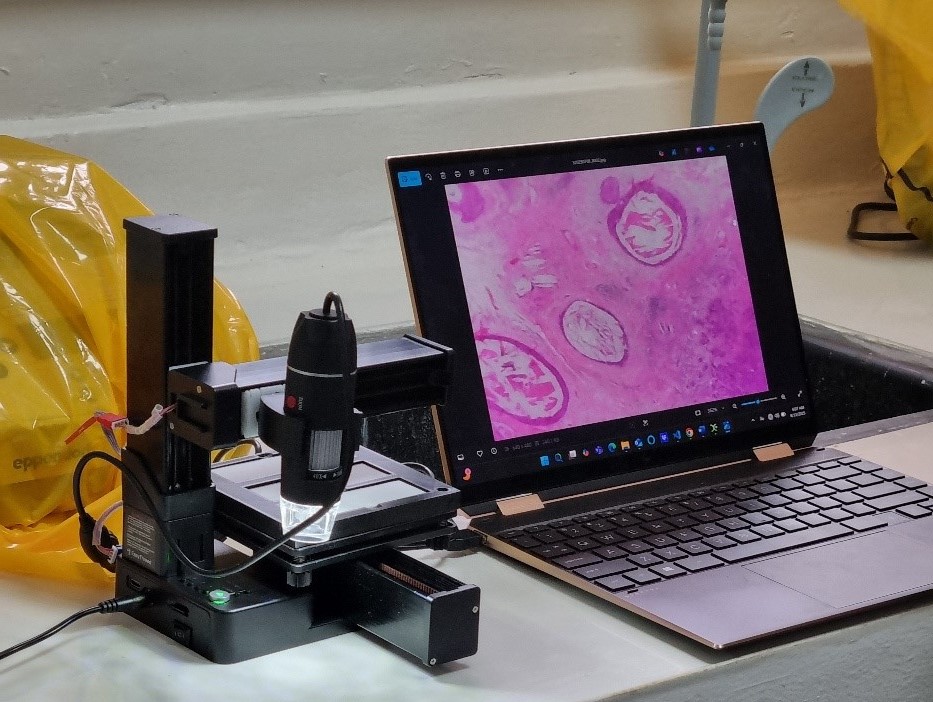AI-powered diagnostics set to revolutionize cancer care in Uganda through Johns Hopkins, Makerere, and MUST collaboration
Developed by a team of graduate biomedical engineers from Johns Hopkins' Center for Bioengineering Innovation and Design (CBID), Ekyaalo Diagnostics is a portable whole-slide scanner (WSS) intended to digitize cytology samples directly at lower-level health facilities, such as Health Centre IVs and General Hospitals.

A groundbreaking collaboration between Johns Hopkins University (JHU) and Uganda’s Makerere University and Mbarara University of Science and Technology (MUST) is spearheading innovative solutions that leverage artificial intelligence (AI) and low-cost technologies to drastically improve early cancer diagnosis and treatment across Uganda. This initiative aims to bridge critical gaps in healthcare access, particularly for underserved populations.
At the forefront of this effort is Ekyaalo Diagnostics, a pioneering AI-powered technology designed to significantly reduce the turnaround time for breast cancer diagnosis. Developed by a team of graduate biomedical engineers from Johns Hopkins’ Center for Bioengineering Innovation and Design (CBID), Ekyaalo Diagnostics is a portable whole-slide scanner (WSS) intended to digitize cytology samples directly at lower-level health facilities, such as Health Centre IVs and General Hospitals.
These digitized images can then be securely transmitted to pathologists at higher-level facilities for timely review, eliminating the arduous and often lengthy process of physically transporting samples to central laboratories in Kampala. This innovation holds the potential to slash diagnosis delays from several months to just a few days, thereby dramatically improving survival outcomes for breast cancer patients.
The Centre for Maternal, Newborn, and Child Health Research at Makerere University School of Public Health, led by Associate Professor Peter Waiswa, hosted the JHU CBID team in July. During their visit, the team undertook an extensive learning tour across the Ministry of Health, Uganda Cancer Institute, and regional cancer referral centres including Mulago, Jinja, Mbarara, and Fort Portal.
The purpose was to map key stakeholders, gather crucial usability feedback for Ekyaalo Diagnostic technology, and gain a deeper understanding of Uganda’s local innovation ecosystem in breast cancer care. Usability interviews were conducted with clinicians, laboratory technologists, and surgeons, providing vital insights into real-world challenges and needs.
Beyond Ekyaalo Diagnostics, local researchers are also advancing other critical innovations. At Makerere University’s Department of Biomedical Engineering, teams are developing artificial breast prototypes to be used in educating women on breast cancer symptoms, fostering early self-detection. Concurrently, Mbarara University, under the leadership of Dr. William Waswa, is developing PapsAI, a low-cost automated tool aimed at supporting whole slide scanning for cervical cancer screening.
These comprehensive initiatives are strategically aligned with Uganda’s National Cancer Control Plan (NCCP) of the Ministry of Health, which emphasizes prevention, early detection, timely diagnosis, and treatment to reduce incidence, morbidity, and mortality from cancer.
Despite the promising advancements, the team’s findings from their field tour highlighted several persistent challenges that must be addressed for these technologies to achieve sustainable success in Uganda.
One significant barrier is limited staffing. Many lower-level health facilities lack adequately trained laboratory personnel to prepare slides. This necessitates that new technologies like Ekyaalo and PapsAI be designed for simplicity, user-friendliness, and rapid adoption after short training sessions.
Another major hurdle is equipment maintenance. Past medical innovations in Uganda have often struggled with frequent breakdowns and software failures. The team stressed that new diagnostic tools must be affordable, durable, and resistant to common system crashes to effectively serve rural health facilities over the long term.
Finally, high operational costs continue to undermine sustainability. Some innovations fail due to exorbitant maintenance costs or incompatibility with existing health systems. Ensuring cost-effectiveness and seamless system integration will therefore be vital for the long-term success of these life-saving diagnostic technologies in Uganda.
The project is jointly led by the Johns Hopkins CBID, Makerere’s Department of Biomedical Engineering, and MUST researchers. The success of the field learning tour and ongoing development is attributed to the invaluable collaboration and technical input from multiple stakeholders, including Mulago National Referral Hospital’s pathology department, the Uganda Cancer Institute, regional referral hospitals, and various general hospitals and Health Centre IVs. The Center for Bioengineering Innovation and Design (CBID) at Johns Hopkins University has generously provided funding for this critical field learning tour.







